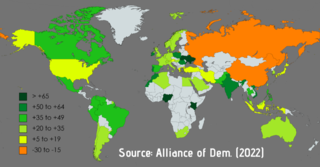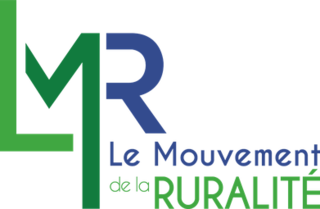
Euroscepticism, also spelled as Euroskepticism or EU-scepticism, is a political position involving criticism of the European Union (EU) and European integration. It ranges from those who oppose some EU institutions and policies, and seek reform, to those who oppose EU membership and see the EU as unreformable. The opposite of Euroscepticism is known as pro-Europeanism, or European Unionism.

The Rurality Movement, formerly Hunting, Fishing, Nature and Traditions is an agrarianist political party in France that aims to defend the traditional values of rural France. Its leader is Eddie Puyjalon. The party states it is neither right nor left but represents rural people on the whole in their diversity.
The Movement for France was a conservative Eurosceptic French political party, founded on 20 November 1994, with a marked regional stronghold in the Vendée. It was led by Philippe de Villiers, once communications minister under Jacques Chirac.
Daniel Mirosław Pawłowiec is a Polish politician and journalist. He was a deputy in the Sejm V term and was a deputy minister in the government of Jaroslaw Kaczynski.
Declan James Ganley is an English-born Irish entrepreneur, businessman, and political activist. He was the founder and leader of the Irish branch of the eurosceptic Libertas Party.

A European political foundation, formally a political foundation at European level, informally a Eurofoundation, is a research and advocacy organization close to, but independent from a Europarty. They are funded by the European Parliament. Their purpose is to act as platforms aiming at developing forward-looking ideas and concepts for their respective political family and providing a forum where those ideas can be widely debated. There are nine Eurofoundations as of 16 March 2009.

Svobodní is a classical liberal and right-libertarian, Eurosceptic political party in the Czech Republic founded in 2009 by Petr Mach, an economist and professor of macroeconomics. Before assuming his position as an MEP, Mach taught economics at VŠFS and VŠEM. The party is led by Libor Vondráček.
Libertas was a pan-European political party founded by Declan Ganley that took part in the 2009 European Parliament election in several member states of the European Union. It won one seat in France.
Polish Social Movement Forward, more usually rendered as Forward Poland was a national-conservative and Eurosceptic political party in Poland. It contended the 2009 European Parliament elections under a common banner with Polish People's Party "Piast". It was formed mainly by former members of the League of Polish Families (LPR), including its leader Janusz Dobrosz.
Libertas Poland was a political party in Poland. It contended the 2009 European Parliament elections under a common banner with Libertas Party Limited, the organization founded by Declan Ganley.
Libertas France is the name given to the activities of Declan Ganley's Libertas Party in France. Unlike Libertas in other countries, Libertas France was not a political party in its own right. Instead, candidates from Mouvement pour la France (MPF) and Chasse, Pêche, Nature et Traditions (CPNT) contended the 2009 European Parliament elections in France under common lists branded with the Libertas identity. The candidates retained their membership of their national parties and the national parties retained their legal identity.
Libertas UK may refer to three political parties in the United Kingdom: two are regional affiliates of Declan Ganley's Libertas Party Limited, one of which, Pro-Democracy: Libertas.eu, contended the 2009 European Parliament elections under a common banner with Libertas Party Limited. The third was formed by an associate of the United Kingdom Independence Party (UKIP).
Libertas Sweden is a political party in Sweden. It intended to contend the 2009 European Parliament elections under a common banner with Declan Ganley's Libertas.eu.
Libertas Ireland was a minor, Eurosceptic political party in Ireland. It contended the 2009 European Parliament elections in Ireland under a common banner with Declan Ganley's Libertas.eu. It shared a headquarters with Libertas.eu but was a national party in its own right for the purposes of Irish electoral law.
Libertas.cz is a eurosceptic party in the Czech Republic that was founded in 2009 by the former media entrepreneur and MEP Vladimír Železný. After some controversies it became an associate of Declan Ganley's pan-European alliance Libertas.eu.
Libertas Malta was a political party in Malta set up to contest the 2009 European Parliament elections under a common banner with Libertas.eu. Its only candidate Mary Gauci failed to be elected and the party has been inactive since.
Libertas Netherlands is a political party in the Netherlands. It contended the 2009 European Parliament elections under a common banner with Libertas Party Limited, the organization founded by Declan Ganley.

Responsibility – Social Democratic Alliance of Political Parties was a political coalition in Latvia, until 2010 called Libertas.lv, which was the local branch of Declan Ganley's Libertas Party. Unlike Libertas in other countries, Libertas Latvia was not a political party in its own right. Instead, candidates from Mūsu Zeme, Sociālā Taisnīguma Partija and Latvijas Atmoda contended the 2009 European Parliament elections in Latvia under common lists branded with the Libertas identity. The candidates retained their membership of their national parties and the national parties retained their legal identity.
Libertas Spain is the name given to the activities of Declan Ganley's Libertas.eu in Spain. Unlike Libertas in other countries, Libertas Spain was not a political party in its own right. Instead, candidates with no national party affiliation and candidates from Citizens – Party of the Citizenry, Partido Social Demócrata and Unión del Pueblo Salmantino contended the 2009 European Parliament elections in Spain under a common list branded with the Libertas identity. The candidates retained their membership of their national parties and the national parties retained their legal identity.





